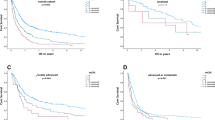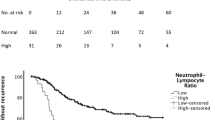Abstract
Background
Evidence is increasing that elevated systemic inflammation is associated with poor survival in patients with oesophageal carcinoma. However, it is not yet established if any specific component of systemic inflammatory response is a better predictor of cancer survival. The aim of the present study was to compare the predictive value of selected markers of systemic inflammation in patients who undergo surgical resection of oesophageal cancer.
Methods
One hundred twelve patients who underwent potentially curative resection for oesophageal carcinoma, including type I and type II tumours of the gastro-oesophageal junction (Siewert and Stein in Dis Esophagus 9:173–182, 1996), between 1996 and 2008 were included in the study. Patients had laboratory measurement of white cells, neutrophils, lymphocytes, platelet counts, albumin, and C-reactive protein. Glasgow Prognostic Score (mGPS), neutrophil lymphocyte ratio (NLR), platelet lymphocyte ratio (PLR), and metastatic lymph node ratio (LNR) were calculated.
Results
On multivariate analysis, only the LNR (HR 2.87, 95% CI 1.99-4.15, p < 0.001) and the mGPS (HR 4.31, 95% CI 2.20-8.45, p < 0.001) were independently associated with cancer-specific survival in oesophageal cancer. An elevated mGPS was associated with high white cell count (p < 0.05) and poorer survival (p = 0.001).
Conclusion
The present study indicates that the mGPS, an acute-phase protein-based prognostic score, better predicts cancer survival compared with the cellular components of systemic inflammation in patients with oesophageal carcinoma.


Similar content being viewed by others
References
Scottish Audit of Gastric and Oesophageal Cancer Steering Group (2002) Gilbert FJ, Park KG, Thompson AM (eds), Scottish Audit of Gastric and Oesophageal Cancer (SAGOC) Report 1997-2000: A Prospective Audit. Available at http://www.crag.scot.nhs.uk/committees/ceps/reports/0_prelims.pdf
Roder JD, Busch R, Stein HJ, Fink U, Siewert JR (1994) Ratio of invaded to removed lymph nodes as a predictor of survival in squamous cell carcinoma of the oesophagus. Br J Surg 81:410–413
Hsu WH, Hsu PK, Hsieh CC, Huang CS, Wu YC (2009) The metastatic lymph node number and ratio are independent prognostic factors in esophageal cancer. J Gastrointest Surg 13:1913–1920
Liu YP, Ma L, Wang SJ, Chen YN, Wu GX, Han M, Wang XL (2010) Prognostic value of lymph node metastases and lymph node ratio in esophageal squamous cell carcinoma. Eur J Surg Oncol 36(2):155–159
Saha AK, Sutton C, Rotimi O, Dexter S, Sue-Ling H, Sarela AI (2009) Neoadjuvant chemotherapy and surgery for esophageal adenocarcinoma: prognostic value of circumferential resection margin and stratification of N1 category. Ann Surg Oncol 16:1364–1370
McMillan DC (2009) Systemic inflammation, nutritional status and survival in patients with cancer. Curr Opin Clin Nutr Metab Care 12:223–226
Roxburgh CS, McMillan DC (2010) Role of systemic inflammatory response in predicting survival in patients with primary operable cancer. Future Oncol 6:149–163
Nozoe T, Saeki H, Sugimachi K (2001) Significance of preoperative elevation of serum C-reactive protein as an indicator of prognosis in esophageal carcinoma. Am J Surg 182:197–201
Shimada H, Nabeya Y, Okazumi S, Matsubara H, Shiratori T, Aoki T, Sugaya M, Miyazawa Y, Hayashi H, Miyazaki S, Ochiai T (2003) Elevation of preoperative serum C-reactive protein level is related to poor prognosis in esophageal squamous cell carcinoma. J Surg Oncol 83:248–252
Ikeda M, Natsugoe S, Ueno S, Baba M, Aikou T (2003) Significant host- and tumor-related factors for predicting prognosis in patients with esophageal carcinoma. Ann Surg 238:197–202
Gockel I, Dirksen K, Messow CM, Junginger T (2006) Significance of preoperative C-reactive protein as a parameter of the perioperative course and long-term prognosis in squamous cell carcinoma and adenocarcinoma of the oesophagus. World J Gastroenterol 12:3746–3750
Crumley AB, McMillan DC, McKernan M, Going JJ, Shearer CJ, Stuart RC (2006) An elevated C-reactive protein concentration, prior to surgery, predicts poor cancer-specific survival in patients undergoing resection for gastro-oesophageal cancer. Br J Cancer 94:1568–1571
Shimada H, Oohira G, Okazumi S, Matsubara H, Nabeya Y, Hayashi H, Takeda A, Gunji Y, Ochiai T (2004) Thrombocytosis associated with poor prognosis in patients with esophageal carcinoma. J Am Coll Surg 198:737–741
Crumley AB, Stuart RC, McKernan M, Going JJ, Shearer CJ, McMillan DC (2010) Comparison of pre-treatment clinical prognostic factors in patients with gastro-oesophageal cancer and proposal of a new staging system. J Gastrointest Surg 14(5):781–787
Siewert JR, Stein HJ (1996) Adenocarcinoma of the gastroesophageal junction. Classification, pathology and extent of resection. Dis Esophagus 9:173–182
Sobin LH, Wittekind C (eds) (2002) TNM classification of malignant tumours, 6th edn. Wiley, Hoboken, NJ
Medical Research Council Oesophageal Cancer Working Group (2002) Surgical resection with or without preoperative chemotherapy in oesophageal cancer: a randomised controlled trial. Lancet 359:1727-1733
McMillan DC, Elahi MM, Sattar N, Angerson WJ, Johnstone J, McArdle CS (2001) Measurement of the systemic inflammatory response predicts cancer-specific and non-cancer survival in patients with cancer. Nutr Cancer 41:64–69
McMillan DC (2008) An inflammation-based prognostic score and its role in the nutrition-based management of patients with cancer. Proc Nutr Soc 67:257–262
Ikeda M, Furukawa H, Imamura H, Shimizu J, Ishida H, Masutani S, Tatsuta M, Satomi T (2002) Poor prognosis associated with thrombocytosis in patients with gastric cancer. Ann Surg Oncol 9:287–291
Maltoni M, Caraceni A, Brunelli C, Broeckaert B, Christakis N, Eychmueller S, Glare P, Nabal M, Vigano A, Larkin P, De Conno F, Hanks G, Kaasa S (2005) Steering Committee of the European Association for Palliative Care Prognostic factors in advanced cancer patients: evidence-based clinical recommendations—a study by the Steering Committee of the European Association for Palliative Care. J Clin Oncol 23:6240–6248
Yamanaka T, Matsumoto S, Teramukai S, Ishiwata R, Nagai Y, Fukushima M (2007) The baseline ratio of neutrophils to lymphocytes is associated with patient prognosis in advanced gastric cancer. Oncology 73:215–220
Rashid F, Waraich N, Bhatti I, Saha S, Khan RN, Ahmed J, Leeder PC, Larvin M, Iftikhar SY (2010) A pre-operative elevated neutrophil:lymphocyte ratio does not predict survival from oesophageal cancer resection. World J Surg Oncol 8:1
Leitch EF, Chakrabarti M, Crozier JE, McKee RF, Anderson JH, Horgan PG, McMillan DC (2007) Comparison of the prognostic value of selected markers of the systemic inflammatory response in patients with colorectal cancer. Br J Cancer 97:1266–1270
Morley JE, Thomas DR, Wilson MM (2006) Cachexia: pathophysiology and clinical relevance. Am J Clin Nutr 83:735–743
Fearon KC, Voss AC, Hustead DS (2006) Cancer Cachexia Study Group Definition of cancer cachexia: effect of weight loss, reduced food intake, and systemic inflammation on functional status and prognosis. Am J Clin Nutr 83:1345–1350
Du Clos TW, Mold C (2004) C-reactive protein: an activator of innate immunity and a modulator of adaptive immunity. Immunol Res 30:261–277
Canna K, McArdle PA, McMillan DC, McNicol AM, Smith GW, McKee RF, McArdle CS (2005) The relationship between tumour T-lymphocyte infiltration, the systemic inflammatory response and survival in patients undergoing curative resection for colorectal cancer. Br J Cancer 92:651–654
de Jong KP, Hoedemakers RM, Fidler V, Bijzet J, Limburg PC, Peeters PM, de Vries EG, Slooff MJ (2004) Portal and systemic serum growth factor and acute-phase response after laparotomy or partial hepatectomy in patients with colorectal liver metastases: a prognostic role for C-reactive protein and hepatocyte growth factor. Scand J Gastroenterol 39:1141–1148
Krzystek-Korpacka M, Matusiewicz M, Diakowska D, Grabowski K, Blachut K, Kustrzeba-Wojcicka I, Terlecki G, Gamian A (2008) Acute-phase response proteins are related to cachexia and accelerated angiogenesis in gastroesophageal cancers. Clin Chem Lab Med 46:359–364
Richards CH, Leitch EF, Horgan PG, Anderson JH, McKee RF, McMillan DC (2010) The relationship between patient physiology, the systemic inflammatory response and survival in patients undergoing curative resection of colorectal cancer. Br J Cancer 103:1356–1361
Roxburgh CS, Platt JJ, Leitch EF, Kinsella J, Horgan PG, McMillan DC (2011) Relationship between preoperative comorbidity, systemic inflammatory response, and survival in patients undergoing curative resection for colorectal cancer. Ann Surg Oncol 18(4):997–1005
Colotta F, Allavena P, Sica A, Garlanda C, Mantovani A (2009) Cancer-related inflammation, the seventh hallmark of cancer: links to genetic instability. Carcinogenesis 30:1073–1081
Kobayashi T, Teruya M, Kishiki T, Endo D, Takenaka Y, Tanaka H, Miki K, Kobayashi K, Morita K (2008) Inflammation-based prognostic score, prior to neoadjuvant chemoradiotherapy, predicts postoperative outcome in patients with esophageal squamous cell carcinoma. Surgery 144:729–735
Vashist YK, Loos J, Dedow J, Tachezy M, Uzunoglu G, Kutup A, Yekebas EF, Izbicki JR (2011) Glasgow Prognostic Score is a predictor of perioperative and long-term outcome in patients with only surgically treated esophageal cancer. Ann Surg Oncol 18(4):1130–1138
Mariette C, Piessen G, Briez N, Triboulet JP (2008) The number of metastatic lymph nodes and the ratio between metastatic and examined lymph nodes are independent prognostic factors in esophageal cancer regardless of neoadjuvant chemoradiation or lymphadenectomy extent. Ann Surg 247:365–371
Dhar DK, Hattori S, Tonomoto Y, Shimoda T, Kato H, Tachibana M, Matsuura K, Mitsumoto Y, Little AG, Nagasue N (2007) Appraisal of a revised lymph node classification system for esophageal squamous cell cancer. Ann Thorac Surg 83:1265–1272
Greenstein AJ, Litle VR, Swanson SJ, Divino CM, Packer S, Wisnivesky JP (2008) Prognostic significance of the number of lymph node metastases in esophageal cancer. J Am Coll Surg 206:239–246
Acknowledgment
We acknowledge the support and interest of Margaret McKernan and Robert Stuart.
Disclosure
The authors have no conflicts of interest or financial ties to disclose.
Author information
Authors and Affiliations
Corresponding author
Rights and permissions
About this article
Cite this article
Dutta, S., Crumley, A.B.C., Fullarton, G.M. et al. Comparison of the Prognostic Value of Tumour- and Patient-Related Factors in Patients Undergoing Potentially Curative Resection of Oesophageal Cancer. World J Surg 35, 1861–1866 (2011). https://doi.org/10.1007/s00268-011-1130-7
Published:
Issue Date:
DOI: https://doi.org/10.1007/s00268-011-1130-7




